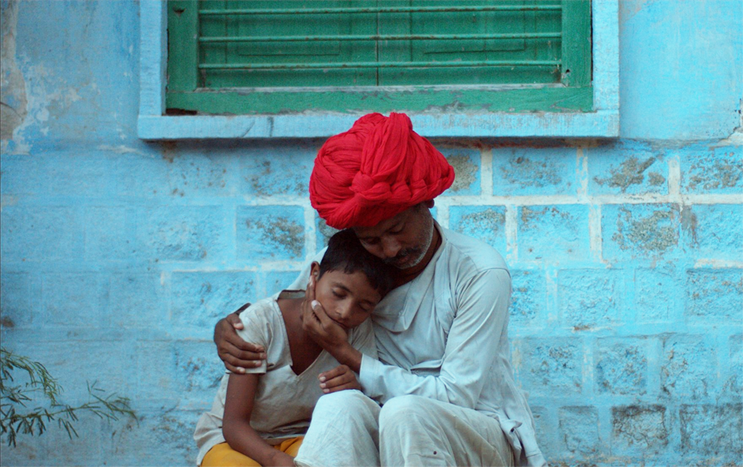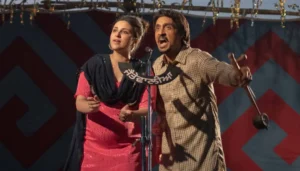
Director Nishil Sheth’s debut feature film is titled Bhasmasur. A demon from Hindu mythology, Bhasmasur is known to have asked for a peculiar boon from Lord Shiva – the ability to eliminate anyone by mere placement of his palms on their heads. Largely a spiteful character, the real Bhasmasur defined prototypical evil unlike the one in Seth’s film. Taken care of by the ten-year-old Tipu (Mittal Chouhan), Bhasmasur is the name of a donkey whose listless existence in an impoverished household is nothing but harmless.
A coming-of-age drama, Bhasmasur kicks off with a sneak peek into the family’s dubious financial state. Tipu and his mute sister Gunni, in an early scene, are stealing grains – as if it is the most normal thing to do. In no time, we learn how their father Dhaanu (Imran Rasheed) is a farmer drowned in deep debt. It is also known that their uncle had committed suicide. Tipu’s poor family is dealing with an awful drought somewhere in interior Rajasthan. It isn’t hard to imagine that they fail to make ends meet and that how poverty is a vicious circle that they’ll never come out of.
The film kicks off when the father decides to sell Bhasmasur in the city market. A disillusioned Tipu is ordered to join on the trip to the city, which is long and arduous. Over its course, the film narrates the parallel journey that the two of them take to strike a friendship that they never explored in the past.
What struck me at first is the tranquil pace of the film. Bhasmasur is not here to prove a verbal point to anyone. Dialogues are scarce, making the film abundant in visual cues. It is one such film that will make you miss nuances if your glance is away from the screen for a few seconds. It is in Bhasmasur’s lack of activity that the story processes, one layer at a time. By the time Sheth establishes his setting, its elements and their status quo with each other, we are convinced about the need for the father to sell the donkey or basically sell anything that is saleable. As a result, we do not seem to emotionally question the man just because his son feels bad for the animal.
The journey en route to the city is filled with little milestones where the father-son duo communicates a lot. There is a stray moment where the father is seen to pleasure himself and the son accidentally sees him. Seconds later, a frame composed with both on either ends and the donkey in the centre is enough for the filmmaker to convey the embarrassment with precision. We hear them talk about Tipu’s mother and what she meant to both of them. They discover a water body after being thirsty and dirty for long. They take a dip in it and play like children. Now, in strictly ideal terms, these are not situations that you would find in the same film. I saw slices of Love Sonia, the sensitivity of Dhanak and the silences of Rukh. Still, Bhasmasur’s ability to not belong to any of their respective spaces is where its appeal germinates from.
Sheth’s film also carries its sad tenor with confidence. As the film slowly spirals into an abyss of sorrow, Bhasmasur makes sure that the foundation was laid way back in the narrative. For instance, the game that Tipu plays with his friends is a good enough precursor. So is the moment where Tipu unties the donkey and it refuses to leave the premises – which could be metaphoric to many a turmoil that Tipu’s father undergoes in the final act. What did not work for me was the mentally unstable gentleman in the city. If the writers meant to convey any greater meanings through his presence, it did not come through effectively. I didn’t particularly decipher the generic affection that Tipu’s friend has for him. Perhaps it is a children’s thing but the friendship – in the absence of solid footing – sticks out as an unnecessary add-on. Rather I would have appreciated a tender moment between Tipu and Gunni as he leaves for the city.
Performances are balanced with each of them staying within the seams set by the characterizations. Trimala Adhikari surprises in a brief rustic turn whereas Mittal Chouhan and Imran Rasheed are able to translate a muted yet sparkling child-parent equation. Cinematography by Shirish Tomar works well in harmonizing the film’s detached tone and quiet demeanour. The still frames do a great deal of talking and several of Tomar’s establishing and closing shots, in particular, contribute to making profound visual statements. Editor Pavan Bhat’s frame selection and their decidedly prolonged duration take its own sweet time to settle in the film’s syntax. Once we are used to this storytelling pattern, Bhasmasur refuses to bother you with its slow-burn mood.
As the film ends, we are in for an unpleasant surprise and even then Sheth and Raghav Dutt’s screenplay assures that the protagonist gets to grieve. Also, from a different standpoint, the slightly open-ended treatment suggests a meaningful tomorrow to all the characters. Yes, it is one of those films. Also, what’s better than the resplendent closing shot by the dusk where Dhaanu stares at the open sky with certain little strips of clothes lying hung on a tree branch?
Rating: ★★★ 1/2

